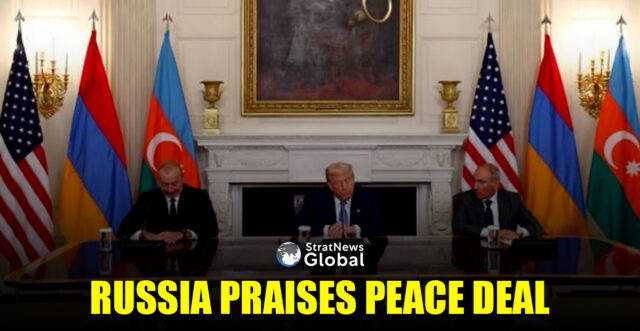Russia on Saturday expressed support for the U.S.-mediated peace agreement between Armenia and Azerbaijan but warned that foreign involvement could complicate the situation in the South Caucasus.
The agreement, signed on Friday during a meeting with U.S. President Donald Trump, includes exclusive U.S. development rights to a transport corridor through Armenia, linking Azerbaijan to its Nakhchivan exclave bordering Turkey.
The deal between the South Caucasus rivals – assuming it holds – would be a significant accomplishment for the Trump administration that is sure to rattle Moscow, which sees the region as within its sphere of influence.
In its first comments, Russia’s Foreign Ministry said Moscow supported efforts to promote stability and prosperity in the region, including the Washington meeting, despite earlier statements from Baku and Yerevan favouring direct talks without mediators.
‘Friends For A Long Time’
“It’s a long time – 35 years – they fought and now they’re friends, and they’re going to be friends for a long time,” Trump said at a signing ceremony at the White House, where he was flanked by Azerbaijani President Ilham Aliyev and Armenian Prime Minister Nikol Pashinyan.
The ministry said that lasting solutions should be developed by regional countries with support from neighbours like Russia, Iran, and Turkey.
“The involvement of non-regional players should strengthen the peace agenda, not create new divisions,” the ministry said, adding that it hoped to avoid the “unfortunate experience” of Western-led conflict resolution in the Middle East.
Armenia and Azerbaijan have been at odds since the late 1980s when Nagorno-Karabakh, a mountainous Azerbaijani region mostly populated by ethnic Armenians, broke away from Azerbaijan with support from Armenia. Azerbaijan took back full control of the region in 2023, prompting almost all of the territory’s 100,000 ethnic Armenians to flee to Armenia.
The peace deal could transform the South Caucasus, an energy-producing region neighbouring Russia, Europe, Turkiye and Iran that is criss-crossed by oil and gas pipelines but riven by closed borders and longstanding ethnic conflicts.
(With inputs from Reuters)





